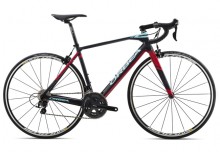 Loading... Please wait...
Loading... Please wait...- Home
- Shop Road Bikes Sale
- 2018 Orbea Orca M30 Pro Bike
2018 Orbea Orca M30 Pro Bike
Product Description
2018 Orbea Orca M30 Pro
There are plenty of great bikes that offer flexibility, a relaxed, neutral position and mellow handling. Orca is not one of them Orca is designed for the guy who has already ridden 6000kms in February and can somehow sustain 500 watts in the middle of winter. The guy whose legs look like they are chiseled directly from the local mountains, the guy you have NEVER beaten, and is always ready to make the pace. Orca is for professionals, hardmen, hardwomen and dedicated weirdos that have never even consider quitting early. Orca is for riders who spend so much time talking about watts and training that you wouldnt dream of inviting them to your party, and they wouldnt come anyway because its past their bedtime. Orca isnt for everyone Do you want to be fast?
Dynamic Structure Stiffness - The Large majority of torsional and lateral loads are handled by the lower spine of the frame. The headtube, downtube and chainstays are shaped to resist twisting and transmit power to the rear wheel. There is no doubt about it, large cross-sections and resistance to flex in the bottom of the frame translate directly to more watts on the road and a sensation that power transfer is instantaneous.
Smoothness - External forces on the frame - cornering stresses or vibration from rough roads - have an effect on control and traction. The seat stays of the new Orca are thinner, the cross-sections and diameters reduced to give maximum traction and control over rough surfaces without compromising global rigidity. The natural flex patterns created by the carbon layup and minimal bulk of the top tube and seat stays deliver a dynamic, smooth ride that feels like floating over rough roads.
Freeflow - Rotation of the spokes and today's wider rims and tires approaching from behind the fork (against the flow of wind as the wheel spins) creates a high pressure/high drag zone. Freeflow spreads the fork legs away from the area to reduce pressure and turbulence. Notmal directional aerodynamics remain unchanged but the bike gets faster becuase the airspace inside the freeflow fork blades is less chaotic.
Orbea Road Racing Geometry - Orca Racing Geometry is born from almost 100 years of designing road racing bikes and is the perfect balance of responsiveness and stability. The position is aggressive to maximize body aerodynamics and efficiency. Handling is precise and intuitive. Angles and dimensions are considered carefully across a range of sizes to put more power to the road with every pedal stroke, and more power means more speed.
The Orbea Orca M30 Pro 2018 Features are:
Frame: Orbea Orca carbon OMP, monocoque, tapered 1-1/8" - 1,5", PF 86mm, powermeter compatible, internal cable routing, EC/DC compatible, 130mm rear spacing, 27,2mm seat tube.
Fork: Orca OMP carbon fork, full carbon steerer, tapered 1-1/8" - 1,5", carbon dropouts.
Headset: FSA 1-1/8 - 1-1/2" Integrated Carbon Cup ACB Bearings
Bars: FSA Energy Compact
Stem: Orbea OC-III
Speed: 22
Front Mech: Shimano 105 5801
Rear Mech: Shimano 105 5800
Shifters Shimano 105 5800
Chainset: Shimano 105 5800 34x50t
Cassette: Shimano 105 5800 11-28t 11-Speed
Chain: KMC X11-EL-1
Front Brake: Shimano 105 5800
Rear Brake: Shimano 105 5800
Rims: Mavic Aksium Elite Clincher
Front Hub: Mavic Aksium Elite Clincher
Rear Hub: Mavic Aksium Elite Clincher
Tyres: Vittoria Rubino Foldable 700x23 60TPI G+ Front, Vittoria Rubino Foldable 700x23 60TPI G+ Rear
Seatpost: FSA S-LK SB20 27,2x400mm Di2 compatible
Pedals: Not Included
Warranty Information
Customers Who Viewed This Product Also Viewed
-
$1,607.40

-
$1,607.40

-
$950.00

-
$1,607.40














